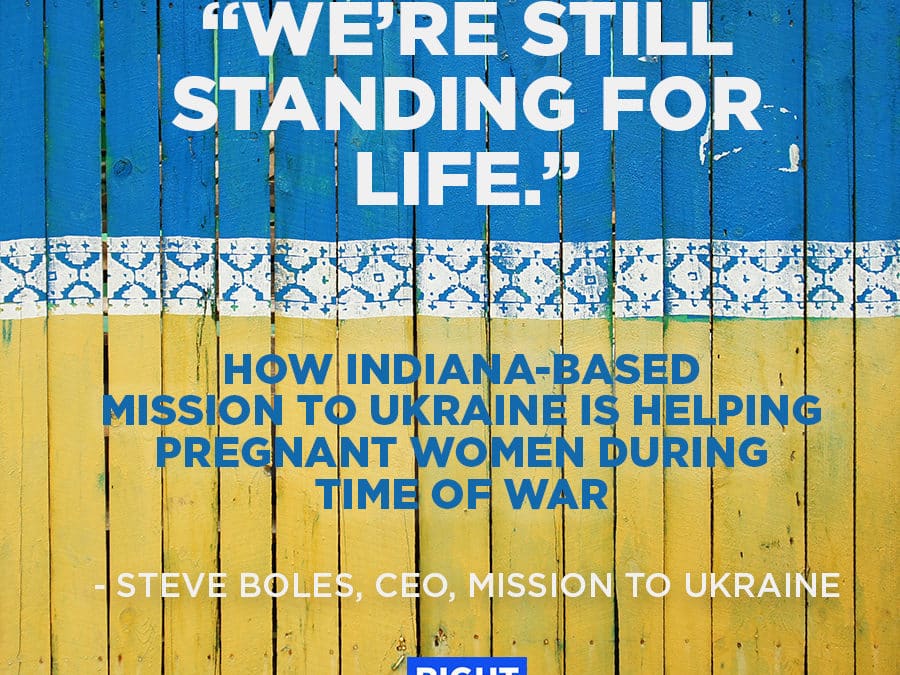About a month ago, there were an estimated 240,000 pregnant women in Ukraine, with about 80,000 of those women expected to give birth in the next three months.
Steve Boles, CEO of Mission to Ukraine—an Indianapolis-based charitable organization that serves families in Zhytomyr, Ukraine—says his group has been helping a sampling of these women and children throughout the chaos of Russia’s full-scale invasion that began on February 24.
In total, Mission to Ukraine has been assisting about 900 new and expecting mothers from their 6 pregnant help locations throughout Zhytomyr.
Between the terror of air raids and the panic of running to the closest bomb shelter, Boles’s staff has been coordinating resources and evacuation efforts for their clients.
Some women have come to them seeking abortions.
“We’ve had women come to us saying, ‘I’m pregnant, I’m scared. I think I should have an abortion, and I heard you guys help women have abortions,’” Boles said in an interview with Indiana Right to Life. “They were mistaken.”
Founded 25 years ago by a couple of Christian Ukrainian women as the country’s first pregnancy help organization, the ministry has grown to a two-part organization of more than 40 employees and 300 volunteers protecting the lives of the unborn and serving the families of children with disabilities.
Last year was the organization’s biggest year yet for its pregnancy help ministry: 415 women chose life thanks to the services of Mission to Ukraine.
“That was our biggest year ever up until December—not realizing that just a few weeks later, the bombing would start,” Boles said.
Since Russia’s full-scale war began a month ago, half of the organization’s employees have fled the country, some for their own safety and some for the sake of coordinating exodus efforts on the border. The organization’s volunteer force has shrunk as well.
Operating with half of its workforce and less than half of its volunteers, Mission to Ukraine’s work has continued. Meanwhile, two local abortion facilities have closed.
To the women seeking abortions in this time of crisis, Boles’s team is trying to empower women with a major, life-affirming message:
“Russia is trying to take life away; they’re trying to kill people,” Boles said. “And we’re still standing for life.”
He’s hopeful that this outlook is encouraging women to stand for life, too.
“Some of the women are choosing to carry to term despite the difficulties around them, which encourages us greatly,” Boles said. “We’ve even seen some of the women decide to put their faith in Christ as a result of this very, very difficult time. And we’re extremely encouraged about that, as well.”
Instead of abortions, Boles’s group is supplying women with essential, hard-to-come-by items, like diapers, baby formula, baby food, and medicine. Thankfully, Mission to Ukraine had stocked up on about three months’ worth of supplies when it appeared tensions with Russia were worsening. Now, that supply is running low, and Boles is looking at ways to rebuild it once more.
But material needs are far from the only concerns ailing his clients right now.
Boles’s staff have found themselves counseling women through major decision points in this new phase of the war. Because men between ages 18 and 60 are required by law to stay in Ukraine and potentially serve in the military, many new and expecting moms are being separated from their husbands, fiancés and boyfriends, forced to embark on parenthood by themselves.
Boles says these women are “functionally single.”
“They feel very alone, and they feel like they have to make the decisions now for their family,” Boles said. “Before, they might discuss it and say, ‘Hey honey, what do you think we ought to do?’ Now, they’re in an apartment with two kids and pregnant and—’I’ve gotta figure out, “Should I go to Poland or should I stay here?”’”
While Mission to Ukraine can’t make those decisions for the moms, they are supplying them with resources, food, medicine, and help with evacuation and housing.
“We can’t tell [them] what to do,” Boles said. “But we want to be there for them and help support them in their decisions.”
So far, about 400 of Mission to Ukraine’s moms have evacuated to Poland, Germany, Romania, Spain, and the Netherlands. About 500 remain in Ukraine.
Looking ahead to the coming months, Boles is planning to continue serving Ukraine’s women and children. Every year, about 800 women come to Mission to Ukraine for pregnancy counseling. In a time of war, the need for those services will surely persist.
Regrettably, other services Mission to Ukraine offers (such as physical and occupational therapy for children with disabilities) are on hold while the group learns to respond to the current crisis. Staff members who primarily served as physical and occupational therapists for the organization before are now tasked with packing beans, rice, and medicine for those in need.
“A little over a month ago, everything was just normal,” Boles said. “Now everybody’s got job descriptions I never expected them to have.”
Long-term, he sees the organization growing to meet unexpected needs created by the war. Potentially, his organization will need to hire one or two psychologists to offer trauma counseling to moms.
Right now, Boles says that what his organization and clients need most is prayer.
“In a very practical sense, there’s not a lot we can do,” he said. “We cannot throw money and make the tanks stop.”
Sustaining and rebuilding the organization during Ukraine’s current crisis will take funding, of course. But Boles knows that to stop the onslaught of war, a Higher Power is needed most.
Click to learn more about supporting Mission to Ukraine


Recent Comments